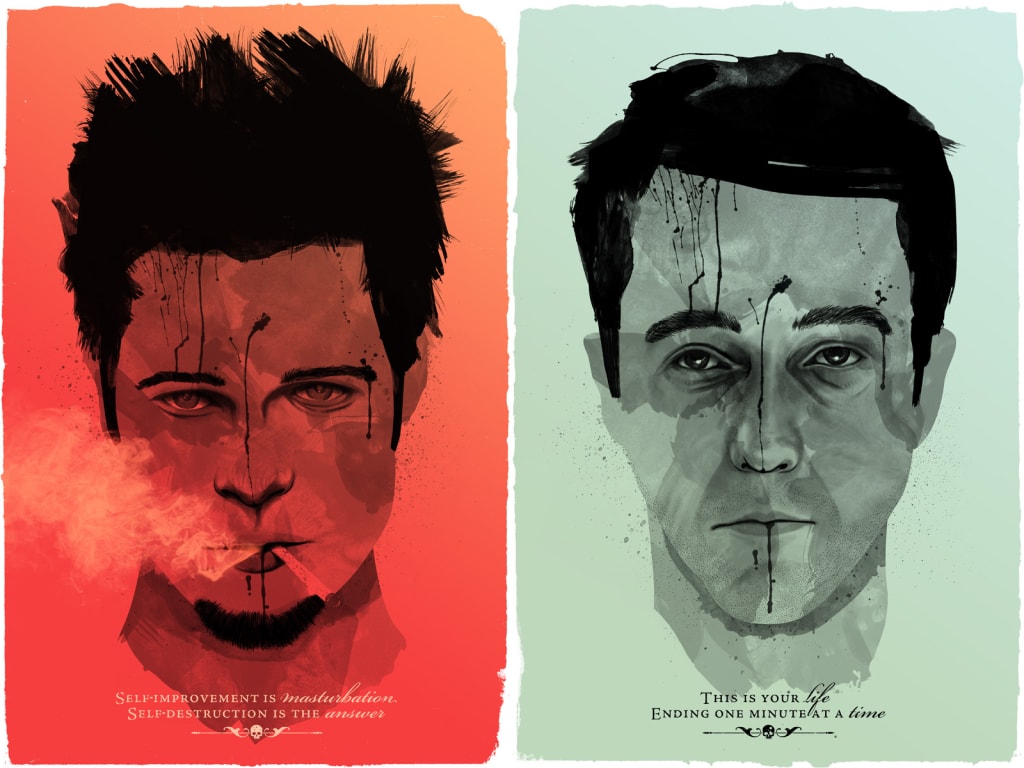Overman of Pain
An Analysis of Friedreich Nietzche's Existentialist Philosophy in 'Fight Club'

In considering the existentialist philosopher, Friedreich Nietszche’s perspective on moving beyond good and evil, or moralities and judgement, to allow for the development of the “Overman,” we should first acknowledge what leads to such an awakening. Primarily, as a contemporary society, we have to realize that “God is dead,” and that we have killed him and made him obsolete as a result of our own inevitable progress in science with evolution theory, the end of the aristocracy, as well as with developments in our own thoughts, behavior, and philosophy. Additionally we also need to recognize our values and perceptions of concepts of morality and judgment and whether or not they’re our own and place ourselves in a mindset of self-valuation. We have to recognize all of these values that are imposed on us from the dual moralities that are the foundation of our social consciousness, Master and Slave Morality.
With Master Morality, what is deemed as good qualities would include superiority, social power, wealth, intelligence, strength, and influence, amongst others. What is then deemed as bad or evil qualities include inferiority, poverty, weakness, stupidity, and humility. With Slave Morality, the values of the former are placed in reverse. Good qualities would be considered humility, forbearance, patience, modesty, and meekness. What is then deemed bad or evil would be superiority, excess power, cruelty, and wealth or greed. Nietzsche emphasizes that the recognition of all this potentially frees us to de-deify nature and the human being and to realize that, alongside with the universe itself, that we are a will to power and nothing besides and we are free to live our own lives by our own true values.
This being established, it could be fairly ascertained that the film, Fight Club, directed by David Fincher and based on the novel by Chuck Palahniuk, very much encapsulates Nietzsche’s perspective. We follow a protagonist, or the Narrator going by no specific name, who at the start of the film is the embodiment of living within the Slave Morality; who drones on in monotonous routine for his job with an automobile firm, and obsesses with stuff upon stuff of what he owns. As a natural response to this numbness, he then becomes engrossed with pain—that it frees him to let go of all that he feels obligated and bound towards and begins to experience premature enlightenment. In going further down this rabbit hole in immersing himself more to pain, experiencing more enlightenment, and thereby bending his level of sanity, he envisions an idealized, alternate version of himself that he knows as Tyler Durden.
In his evident schizophrenia and personality disorder, and as he goes further in exploring Tyler, the Narrator exhibits the gradual awakening and realization of the Overman through first envisioning one—the exact guy he wishes he was but never could be. As he lets more of this other self invade his life and his mind, in becoming more and more obsessed with pain and starting a fight club that would lead to an underground organization between him and Tyler, this forces the Narrator in confrontation with the moralities present to him. He realizes the Master and Slave Moralities that dictate how he lives, specifically with his job and consumerist culture around him that keeps him caged where he is, and how those who go against this grain are essentially shunned and persecuted. He also recognizes the death of God in rejecting materialism and ultimately ends up revolting against it with the underground organization he puts together.
However, as much progress as this Narrator makes, for the bulk of his own actions he was never even conscious of—he was convinced of Tyler being the direct cause of all the chaos and anarchy that took place rather than himself. So, in recognizing the moralities present to him and then allowing himself to de-deify nature and his environment, the Narrator makes the shocking discovery in de-deifying the self that he embodies both Master and Slave and has to then confront his own conflicted and oppressed level of consciousness and “kill off” Tyler to regain control of his true self. In finally fully committing to this, in recognizing himself as a will to power and nothing besides, the Narrator transitions in allowing the Overman of himself to awaken. From being numbed by the comfortable and easy and being owned by that, to being awakened in recognizing his own pain, the Narrator of Fight Club, this Overman of pain, serves as the ideal model of Nietzsche’s perspective as well as being a prominent cinematic figure that may guide those who seek to realize their own Overman in this contemporary era and society.
About the Creator
Anthony Cornatzer
An actor, technician, singer, musician, writer, and columnist, Anthony has an excitable commitment and passion for the arts.






Comments
There are no comments for this story
Be the first to respond and start the conversation.